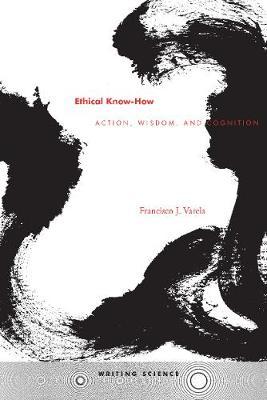Ethical Know-How: Action, Wisdom, and Cognition

Ethical Know-How: Action, Wisdom, and Cognition
How can science be brought to connect with experience? This book addresses two of the most challenging problems facing contemporary neurobiology and cognitive science: understanding how we unconsciously execute habitual actions as a result of neurological and cognitive processes, and creating an ethic adequate to our present awareness that there is no such thing as a transcendental self, a stable subject, or a soul.
How can science be brought to connect with experience? This book addresses two of the most challenging problems facing contemporary neurobiology and cognitive science: first, understanding how we unconsciously execute habitual actions as a result of neurological and cognitive processes that are not formal actions of conscious judgment but part of a habitual nexus of systematic self-organization; second, creating an ethics adequate to our present awareness that there is no such thing as a transcendental self, a stable subject, or a soul. In earlier modes of cognitive science, cognition was conceptualized according to a model of representation and abstract reasoning. In the realm of ethics, this corresponded to the philosophical tenet that to do what is ethical is to do what corresponds to an abstract set of rules. By contrast to this computationalism, the author places central emphasis on what he terms enaction--cognition as the ability to negotiate embodied, everyday living in a world that is inseparable from our sensory-motor capacities. Apart from his researches in cognitive science, the bodies of thought that enable Varela to make this link are phenomenology and two representatives of what he calls the wisdom traditions: Confucian ethics and Buddhist epistemology. From the Confucian tradition, he draws upon the Mencius to propose an ethics of praxis, one in which ethical action is conceived as a project of being rather than as a system of judgment, less a matter of rules that are universally applicable than a goal of expertise, sagehood. The Buddhist contribution to his project encompasses the embodiment of the void and the pragmatics of a virtual self. How does a belief system that does not posit a unitary self or subject conceive the living of an I? In summation, the author proposes an ethics founded on savoir faire that is a practice of transformation based on a constant recognition of the virtual nature of ourselves in the actual operations of our mental lives.
How can science be brought to
How can science be brought to c
PRP: 144.67 Lei
Acesta este Prețul Recomandat de Producător. Prețul de vânzare al produsului este afișat mai jos.
130.20Lei
130.20Lei
144.67 LeiLivrare in 2-4 saptamani
Descrierea produsului
How can science be brought to connect with experience? This book addresses two of the most challenging problems facing contemporary neurobiology and cognitive science: understanding how we unconsciously execute habitual actions as a result of neurological and cognitive processes, and creating an ethic adequate to our present awareness that there is no such thing as a transcendental self, a stable subject, or a soul.
How can science be brought to connect with experience? This book addresses two of the most challenging problems facing contemporary neurobiology and cognitive science: first, understanding how we unconsciously execute habitual actions as a result of neurological and cognitive processes that are not formal actions of conscious judgment but part of a habitual nexus of systematic self-organization; second, creating an ethics adequate to our present awareness that there is no such thing as a transcendental self, a stable subject, or a soul. In earlier modes of cognitive science, cognition was conceptualized according to a model of representation and abstract reasoning. In the realm of ethics, this corresponded to the philosophical tenet that to do what is ethical is to do what corresponds to an abstract set of rules. By contrast to this computationalism, the author places central emphasis on what he terms enaction--cognition as the ability to negotiate embodied, everyday living in a world that is inseparable from our sensory-motor capacities. Apart from his researches in cognitive science, the bodies of thought that enable Varela to make this link are phenomenology and two representatives of what he calls the wisdom traditions: Confucian ethics and Buddhist epistemology. From the Confucian tradition, he draws upon the Mencius to propose an ethics of praxis, one in which ethical action is conceived as a project of being rather than as a system of judgment, less a matter of rules that are universally applicable than a goal of expertise, sagehood. The Buddhist contribution to his project encompasses the embodiment of the void and the pragmatics of a virtual self. How does a belief system that does not posit a unitary self or subject conceive the living of an I? In summation, the author proposes an ethics founded on savoir faire that is a practice of transformation based on a constant recognition of the virtual nature of ourselves in the actual operations of our mental lives.
How can science be brought to
How can science be brought to c
Detaliile produsului










